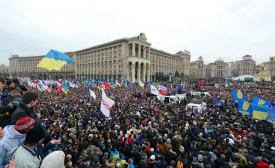russia

The Crimean crisis hits close to home – very close for many in Sacramento, home to one of the largest Ukrainian diaspora communities in the United States. While targeted sanctions against Russia are about to kick in and the tense situation throughout Ukraine remains unpredictable, American policies going forward are likely to be influenced by Ukrainian nationals over time, even after the story fades from current news cycles.
The United States and the European Union have imposed sanctions on dozens of high-ranking Russians in retaliation for Moscow's seizure and annexation of Crimea. The idea, of course, is that imposing asset freezes and visa bans on these individuals will make them think twice when contemplating, say, further military moves against the rest of Ukraine.
Halfway through an otherwise coherent conversation with a Georgian lawyer last week—the topics included judges, the court system, the police—I was startled by a comment he made about his country’s former government, led by ex-president Mikheil Saakashvili. “They were LGBT,” he said, conspiratorially.
Moscow has no intention of sending troops into Ukraine, Russian Foreign Minister Sergei Lavrov has said. His comments came after the US and Russian presidents discussed a possible diplomatic solution to the crisis. The US-backed plan calls for Russia to halt to its military build-up on the border with Ukraine and withdraw its troops in Crimea to their bases.
Earlier this week, Barack Obama again rejected Mitt Romney’s 2012 campaign claim that Russia is America’s biggest “geopolitical foe.” In fact, Obama said, Russia is a regional power acting out of “weakness,” adding that he worries more about a mushroom cloud over New York City than he does about Vladimir Putin.
The U.N. General Assembly voted 100 to 11 with 58 abstentions to call the mid-March referendum in Crimea illegal, to support Ukraine sovereignty and independence, and to reject Russia's use of force to alter its borders.
U.S. President Barack Obama and European Union leaders presented a unified front Wednesday against Russia’s annexation of Crimea, promoting transatlantic trade as an antidote to Russia’s influence in the region and a way to help Europe become less dependent on Moscow for energy.
In the wake of Russia’s annexation of Ukraine’s Crimea region, public concern about Russia has increased, according to a new Pew Research Center survey. Even so, when given the choice, more describe Russia as a serious problem but not an adversary (43%) than say it represents an adversary (26%). Just 22% say Russia is not much of a problem.







